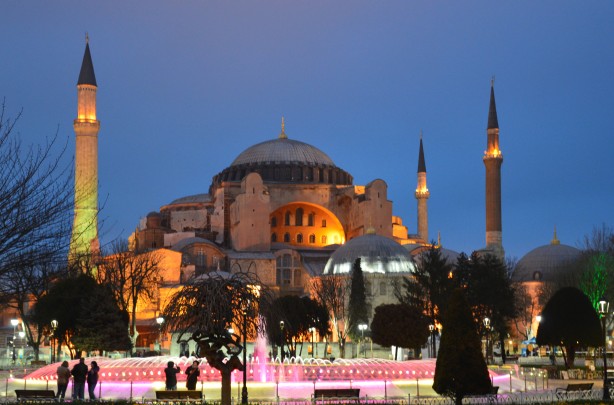All AP Art History Resources
Example Questions
Example Question #62 : Ancient Through Medieval Architecture

The material of the building is __________.
limestone
brick
Ashlar stone
concrete
Ashlar stone
Ashlar stone is a popular building material in this part of the world. It was cut into huge slabs that were then rested atop one other. It was meant to make the interior and exterior of the space appear seamless and smooth. It is the answer to the Roman's concrete recipe.
Image adapted from http://www.publicdomainpictures.net/hledej.php?hleda=hagia+sophia+5.
Example Question #1 : Answering Other Questions About Early Christian, Byzantine, And Early Medieval Architecture
Which Holy Roman Emperor started a cultural revival within the Christian artistic tradition in the late eighth century, divorcing the Church's aesthetic of that deemed the "barbaric style" and inaugurating a movement culminating in the Christianization of central Europe?
Charlemagne
Otto the Great
Lothair II
Frederick II
Charlemagne
Charlemagne, who was crowned in 774, is responsible for this movement. Though his work was continued and evolved under Otto the Great, Charlemagne is ultimately the originator of the codification of the Christian style. This not only created an aesthetic framework for his empire, but also politically united a continent under a religious artistic philosophy. This question requires students to both know their history and to recognize the deep connection between political power and Christian art, setting the tone for the religiously-rooted power struggles that defined much of the Middle Ages.
Example Question #2 : Answering Other Questions About Early Christian, Byzantine, And Early Medieval Architecture
What event most significantly affected the role of Christianity in the Western world, and radically altered the aesthetic of religious art?
The Conversion of Constantine
The Resurrection of Christ
The declaration of Jesus' divinity in the third century
The Birth of Jesus in Bethlehem
The Conversion of Constantine
The conversion of Constantine changed the Christian religion from an increasingly popular cult within the empire to the declared faith of the most powerful man on Earth. Positions of authority within the church became positions of authority within Roman government (In fact, the contemporary outfits for priests and bishops directly correlate to styles popular with Roman aristocracy), endowing Christians with the financial means to become patrons of the arts. Churches, which became monumental artistic commissions, began to appear all over Europe, as Christianity went from the religion of the marginalized to that of the aristocracy. All of these massive changes would have been impossible without the conversion of Constantine, who effectively turned Romanization into Christianization.
All AP Art History Resources




